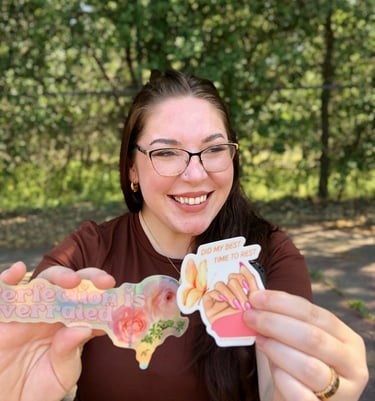💛 Earn rewards when you refer a friend - learn more here

Soft Seasons, Small Wins: A Thanksgiving Survival Guide for Overwhelmed Caregivers
11/23/20254 min read


How to honor your nervous system, create calm, and forgive the messy moments
If you’re feeling stretched thin this week — cooking, hosting, cleaning, parenting, coordinating, remembering a hundred tiny things — you’re not alone. Thanksgiving has a way of turning every caregiver into the glue that holds the entire household together… while quietly pushing their own needs to the bottom of the list.
And here’s the part we don’t say out loud: When everyone needs you, your nervous system takes the hit first.
This is why your home feels louder than usual. Why clutter feels heavier. Why the to-do list feels taller. Why your body is tired in a way that sleep doesn’t quite fix.
So this week, instead of striving for a perfectly spotless home or a flawlessly curated holiday, let’s talk about the three things that matter far, far more:
Your nervous system.
Your capacity.
Your self-forgiveness.
Because those are the things that actually shape the feeling of your home — not how many dishes are in the sink.
1. Your nervous system matters more than your checklist
Most people are taught to approach the holidays like a performance:
Keep the house clean, keep the kids happy, keep the food hot, keep the vibes high… keep it all together.
But your home doesn’t need “together.” It needs you. Regulated. Present. Human.
When overwhelm spikes, clutter blindness kicks in. Your brain jumps into survival mode — fight, flight, freeze, or fawn — and suddenly the smallest mess feels ten times bigger.
This is not laziness. It’s neurobiology.
A regulated nervous system literally changes how you see your space, how you move through it, and how much capacity you have to do anything about it.
And here’s the magic:
Your calm becomes the emotional climate your whole household matches.
Kids soften. Partners co-regulate. Even guests walk in and subconsciously take cues from the energy you’ve set.
This alone is a good enough reason to put your well-being at the top of the holiday list — not at the bottom.
2. Small wins create big emotional relief
Thanksgiving tricks us into believing we need a whole-house reset to feel okay. But your nervous system doesn’t want perfection — it wants progress.
And tiny progress creates instant emotional relief.
Small wins signal safety. They tell your brain, “We’re okay. We can do this.” They create momentum — because done breeds done.
Here are tiny resets that genuinely shift overwhelm:
One clear counter
A 5-minute floor sweep
A sink reset
Trash + recycling out
One load of dishes
Entryway reset
Quick bathroom wipe
A single decluttered surface (nightstand, coffee table, kitchen island)
These aren’t chores. They’re grounding tools — small sensory resets that support your entire household:
Kids regulate faster. ADHD brains calm down. Partners feel motivated instead of unsure where to start.
Tiny wins shift the room enough that everyone breathes deeper.
3. Slow homes are holiday homes
This week is not about achieving aesthetic coziness — it’s about creating emotional coziness.
A slow home isn’t a quiet home or a perfect one. It’s a home that supports your nervous system instead of draining it.
You can create a slow home with surprisingly tiny changes:
Lower the lighting
Add soft textures (blankets, throw pillows, cozy socks)
Use calming scents (vanilla, cinnamon, eucalyptus)
Reduce visual clutter on the main surfaces
Put on warm playlists
Make tidying feel ritualistic, not rushed
Keep a warm drink near you during chores
These small sensory shifts change how your home feels, which changes how your body feels inside it.
When your environment softens, you soften. And when you soften, everyone around you does too.
4. Let your home hold you, too
Caregivers spend so much time holding everyone else that they forget their home can also hold them.
This week, find one corner — just one — where you can exhale:
A made bed
A clean nightstand
A tidy chair with a blanket
A small kitchen section that stays clear
A calm bathroom counter
A cozy nook with a candle
Let that corner be your reset spot. Your safe place. Your deep breath.
A home doesn’t have to be spotless to be soothing. It just needs one landing place where your nervous system can take a breath.
5. Self-forgiveness is the secret to a peaceful holiday home
Shame is loudest during the holidays:
“I should be doing more.”
“My house should look better.”
“I should’ve planned ahead.”
“Everyone else seems to have it together.”
But here’s the truth you need to hear: Holiday homes are real homes — lived in, loved in, messy, loud, warm, imperfect.
Nothing is wrong with you if your house doesn’t look like a movie set.
Mess means life is happening. Noise means connection. Clutter means you’ve been busy caring for real humans.
So this week, practice radical self-forgiveness:
Overscheduled? Forgive.
Forgot something? Forgive.
Clutter creeping in? Forgive.
Needed rest? Forgive.
Takeout for dinner? Forgive and celebrate.
Self-forgiveness creates presence. Presence creates peace. Peace creates rhythms that actually stick.
A final whisper for the caregivers
Soft seasons are sacred.
Slow homes are healing.
Small wins are enough.
And you deserve to feel held too — not just needed.
If you come out of this week feeling drained, or if the post-holiday clutter feels heavier than you want to handle alone… I’m here.
Tidy On Your Terms exists to support your nervous system, your family, and your actual life — not the Pinterest version of it.
Just say the word, and we’ll create a calm season together.

🌿 About the Author
Hi, I’m Jocelyn—the heart behind Tidy On Your Terms. I help people create home systems rooted in self-love, not shame. My work blends cleaning and organizing with nervous system support, forgiveness, and flexibility—because your space should feel like peace, not pressure.
📖 Bring Encouragement Into Your Home
Looking to bring some encouragement into your space?
Check out the paperback Tidy On Your Terms here—a soft, supportive introduction to our approach.




